Gastritis is a condition that involves inflammation of the stomach lining, causing uncomfortable symptoms such as indigestion, stomach pain, and nausea. If you have gastritis, you may be wondering if it is safe to consume strawberries without worsening your symptoms. While there is no specific diet for gastritis, certain dietary choices can potentially help manage the condition and promote digestive health.
Key Takeaways:
- Strawberries can be enjoyed as part of a well-balanced diet for gastritis management.
- Foods rich in antioxidants, like strawberries, may help protect the stomach lining and manage inflammation.
- Strawberries have been found to potentially aid in the prevention of stomach ulcers, H. pylori infection, and gastritis caused by NSAIDs.
- Individuals with kidney problems should consume strawberries in moderation due to their potassium content.
- Consult with healthcare professionals and personalize your gastritis diet to effectively manage symptoms.
What is Gastritis and its Causes?
Gastritis is a condition characterized by inflammation of the stomach lining, which can lead to uncomfortable symptoms such as indigestion, stomach pain, nausea, and weight loss. Understanding the causes of gastritis is essential for managing the condition effectively.
There are various factors that can contribute to the development of gastritis:
- Infection with H. pylori bacteria: This bacterium is a common cause of gastritis and can be transmitted through contaminated food or water.
- Use of nonsteroidal anti-inflammatory drugs (NSAIDs): Long-term and high-dose use of NSAIDs, such as aspirin and ibuprofen, can irritate the stomach lining and lead to gastritis.
- High alcohol consumption: Excessive alcohol intake can irritate the stomach lining and cause inflammation.
- Inflammatory diseases: Conditions like Crohn’s disease and autoimmune disorders can contribute to stomach lining inflammation.
If left untreated, gastritis can lead to complications such as ulcers and an increased risk of stomach cancer. Therefore, it is crucial to manage and treat gastritis effectively by understanding the underlying causes and making necessary dietary and lifestyle changes.
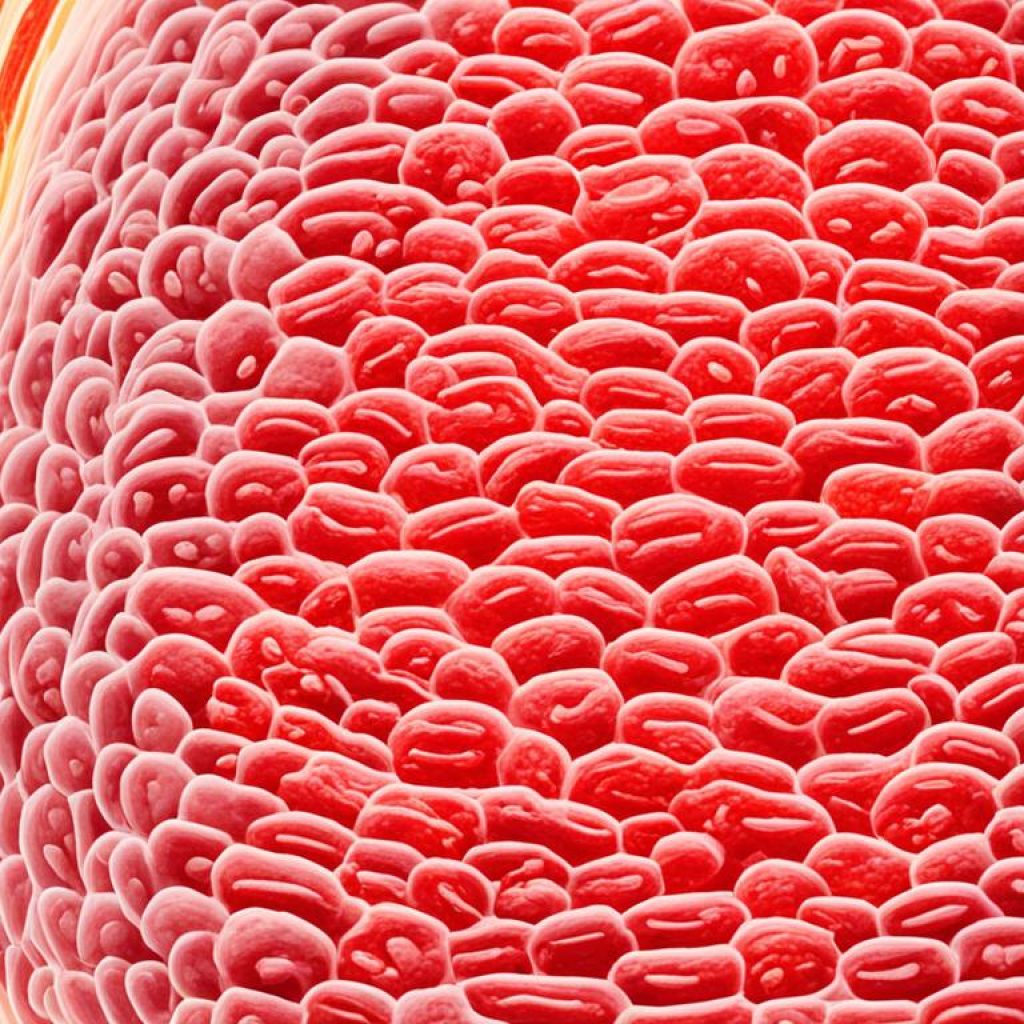
| Gastritis Causes | Symptoms |
|---|---|
| Infection with H. pylori bacteria | Indigestion, stomach pain, nausea |
| Use of NSAIDs | Indigestion, stomach pain, weight loss |
| High alcohol consumption | Indigestion, stomach pain, bloating |
| Inflammatory diseases | Indigestion, weight loss, fatigue |
Can Certain Foods Help with Gastritis?
While there is no specific diet to treat gastritis, making certain food choices can help improve symptoms or prevent them from getting worse. By incorporating foods that have antioxidant and anti-inflammatory properties into your gastritis diet, you can support your digestive health and reduce inflammation in the stomach lining.
Avoiding processed and fatty foods and focusing on a plant-based diet can be beneficial in managing gastritis symptoms. Fresh fruits and vegetables, in particular, are rich in antioxidants, which can help protect the stomach lining and reduce inflammation.
Specific foods that may be beneficial for gastritis include:
- Cauliflower: This cruciferous vegetable is high in antioxidants and supports a healthy digestive system.
- Berries (including strawberries): Berries are packed with antioxidants and have been found to inhibit the growth of H. pylori bacteria, the main cause of gastritis.
- Turmeric: This spice contains curcumin, which has powerful anti-inflammatory properties. It can help reduce inflammation in the stomach and alleviate gastritis symptoms.
An anti-inflammatory diet can also help in managing gastritis symptoms. This type of diet focuses on consuming whole foods, such as fruits, vegetables, whole grains, and lean proteins, while avoiding processed and high-fat foods.
Incorporating these foods into your gastritis diet can help reduce inflammation, protect the stomach lining, and alleviate symptoms. However, it is important to consult with a healthcare professional or registered dietitian before making any significant changes to your diet.
Foods with Antioxidant and Anti-inflammatory Properties
| Food | Antioxidant Properties | Anti-inflammatory Properties |
|---|---|---|
| Cauliflower | Rich in vitamins C and K, and the antioxidant compound called sulforaphane | Contains anti-inflammatory compounds that help reduce inflammation in the body |
| Berries | Loaded with antioxidants like vitamin C, anthocyanins, and ellagic acid | Studies have shown that berries have anti-inflammatory effects and can reduce inflammation in the body |
| Turmeric | Contains curcumin, a powerful antioxidant that gives turmeric its vibrant color | Curcumin has been found to have strong anti-inflammatory effects and can help reduce inflammation in the body |
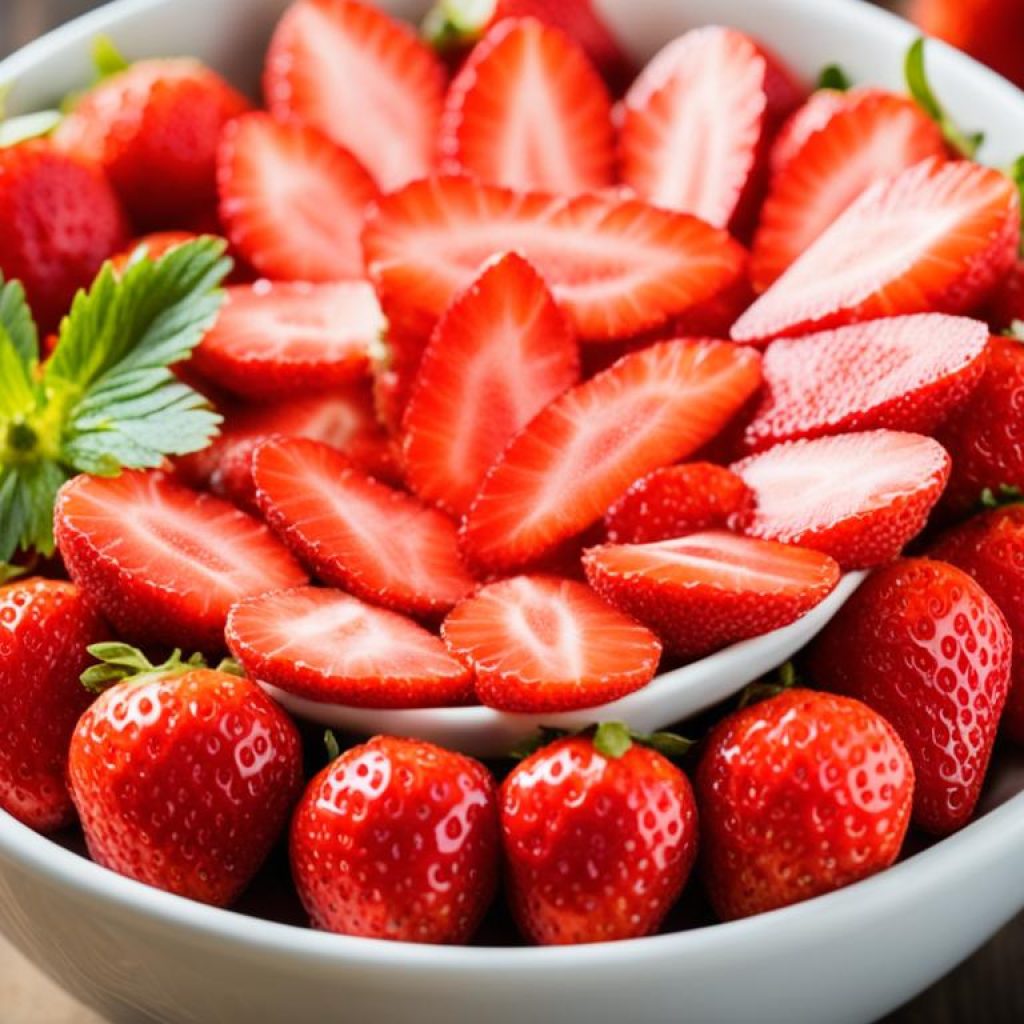
The Potential Benefits of Eating Strawberries with Gastritis
Research suggests that incorporating strawberries into a gastritis diet may have numerous potential benefits for individuals with this condition. Studies conducted on rats have demonstrated that strawberry extracts can protect against alcohol-induced damage to the stomach lining. This protective effect is attributed to the antioxidant activity and polyphenol content of strawberries. By reducing oxidative stress, strawberries may offer a defense against stomach disorders. Moreover, strawberries have shown promising potential in preventing stomach ulcers, H. pylori infection, and gastritis caused by NSAIDs.
One study found that strawberries can help prevent the development of stomach ulcers. The antioxidants and polyphenols present in strawberries are believed to play a role in this protective effect.
“Strawberries have been shown to have a protective effect against stomach ulcers. The antioxidants and polyphenols present in strawberries may contribute to this benefit.”
In addition to stomach ulcers, strawberries may also offer protection against H. pylori infection. H. pylori is a bacteria that can colonize the stomach lining and lead to gastritis and peptic ulcers. The antibacterial properties of strawberries, including their ability to inhibit the growth of H. pylori, make them a potentially valuable addition to a gastritis diet.
Strawberries may also alleviate gastritis caused by nonsteroidal anti-inflammatory drugs (NSAIDs). NSAIDs are known to cause gastric irritation and contribute to gastritis. However, strawberries possess anti-inflammatory properties and may help counteract the inflammation caused by NSAIDs, thus reducing the risk of gastritis development.
It is worth noting that the benefits of strawberries for gastritis are supported primarily by animal studies. While these findings are promising, further research is necessary to fully understand the extent of the benefits and their applicability to human cases of gastritis.
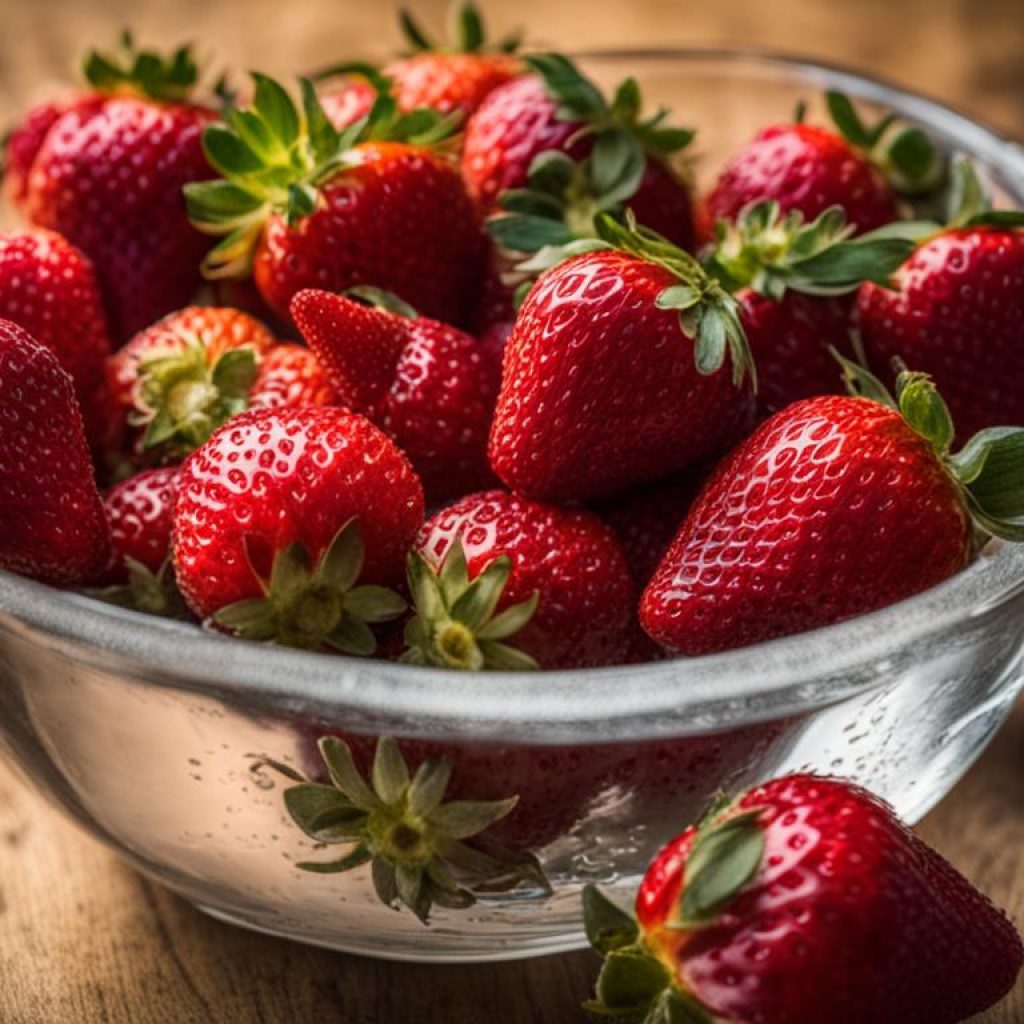
| Benefits of Strawberries for Gastritis | Evidence |
|---|---|
| Protection against alcohol-induced stomach lining damage | Animal studies have demonstrated the antioxidant and polyphenol content of strawberries can protect the stomach lining from alcohol-induced damage. |
| Prevention of stomach ulcers | Strawberries have shown potential in preventing the development of stomach ulcers. The antioxidants and polyphenols in strawberries may play a role in this protective effect. |
| Inhibition of H. pylori growth | The antibacterial properties of strawberries, including their ability to hinder the growth of H. pylori, make them a potentially valuable addition to a gastritis diet. |
| Reduction of NSAIDs-related gastritis | The anti-inflammatory properties of strawberries may help alleviate inflammation caused by NSAIDs, reducing the risk of gastritis associated with these medications. |
Strawberries and Bowel Health
When it comes to bowel health, strawberries have shown promise in animal studies. Researchers have conducted various studies to explore the potential benefits of strawberries on the colon. In one study involving mice, dietary consumption of whole strawberries was found to help treat inflammatory bowel disease (IBD). The mice experienced a reduction in symptoms such as body weight loss and bloody diarrhea.
Another study investigated the impact of strawberries on gut bacteria. It was found that strawberries increased the abundance of beneficial bacteria while decreasing harmful bacteria in the gut. This delicate balance of gut bacteria is crucial for maintaining colonic health and preventing inflammatory diseases of the colon.
These findings suggest that strawberries may have an anti-inflammatory activity and could be beneficial for individuals with inflammatory bowel disease. Incorporating strawberries into the diet may help alleviate symptoms and support overall bowel health.
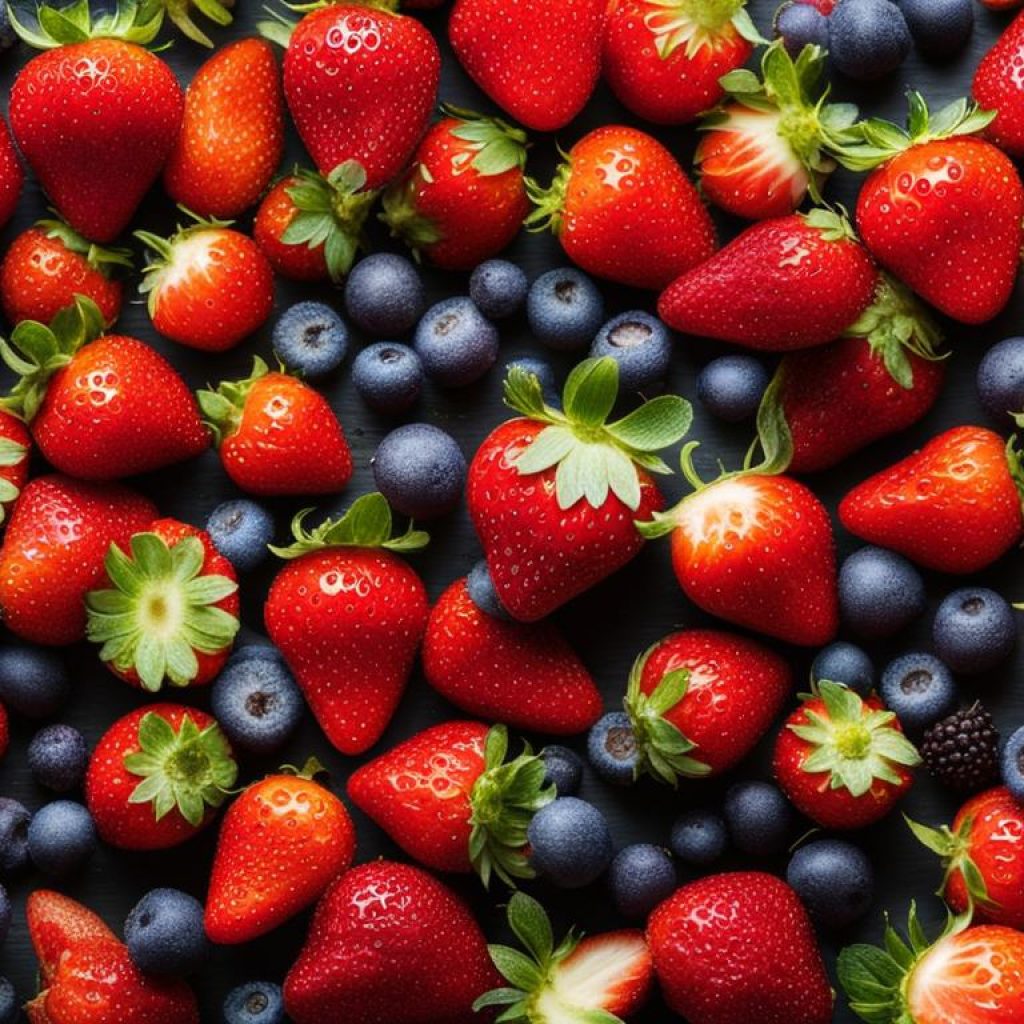
Identifying Fresh Strawberries
To get the most nutritional benefits from eating strawberries, it is best to choose fresh ones. When identifying fresh strawberries, look for medium-sized berries that are deep red or bright red in color. They should appear shiny, firm, and plump, with green and intact caps. Rinse the strawberries with cold water right before eating them to remove any dirt or residues.
Here are some key signs to look for when identifying fresh strawberries:
| Signs of Freshness | Signs of Spoilage |
|---|---|
| The berries are deep red or bright red in color. | The berries are mushy or have dark, soft spots. |
| The berries appear shiny, firm, and plump. | The berries have a moldy or rotten smell. |
| The caps are green and intact. | The caps are brown or wilted. |
By paying attention to these signs of freshness, you can ensure that you’re selecting the best strawberries for your consumption. Enjoying fresh strawberries not only enhances their taste but also ensures that you’re getting the maximum nutritional value from these delicious fruits.
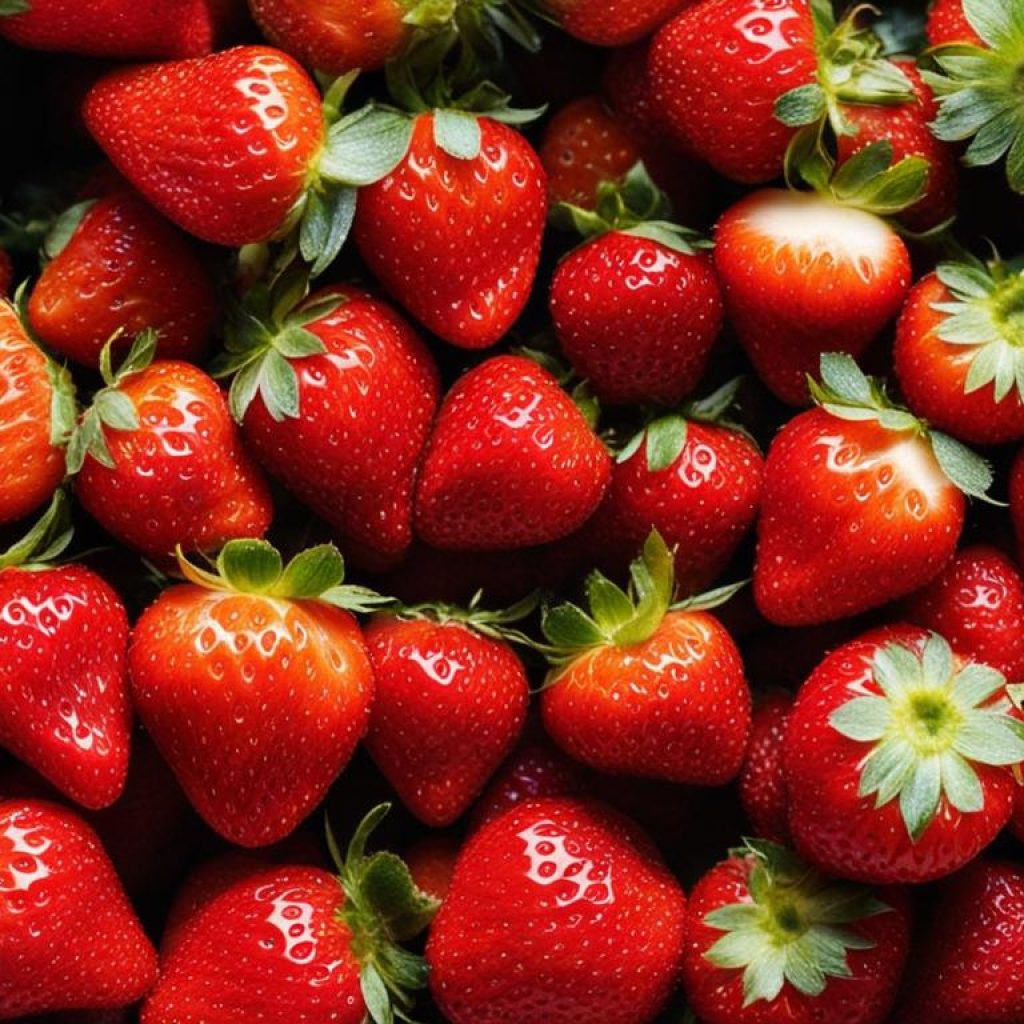
How to Incorporate Strawberries in Your Diet
If you have gastritis, you may be wondering how to include strawberries in your diet. Despite having gastritis, there are several ways to enjoy strawberries while managing your symptoms. Incorporating strawberries into your meals can provide a tasty and nutritious addition to your gastritis diet.
Ways to Enjoy Strawberries with Gastritis
Here are some ideas on how to incorporate strawberries into your gastritis-friendly meals:
- Include fresh strawberries as a whole fruit in your diet.
- Add strawberries to your favorite whole-grain cereal or oatmeal for a burst of flavor.
- Mix strawberries with yogurt or add them to green leafy salads for a refreshing twist.
- Blend strawberries with yogurt or milk to make delicious and nutritious smoothies.
- Use strawberries to make beverages, jams, or jellies as a flavorful accompaniment to your meals.
Considerations and Moderation
While strawberries can be a healthy addition to your gastritis diet, it is important to consume them in moderation. Strawberries contain natural sugars, so excessive consumption may not be suitable for everyone, especially if you have diabetes or other conditions that require sugar control.
Remember to avoid washing and storing strawberries for a prolonged period, as this can lead to mold development. Instead, rinse them with cold water right before consuming them to ensure freshness.
Image and Alt Tag: Keyword – Incorporating Strawberries in Your Diet
Considerations for Individuals with Kidney Problems
Individuals with kidney problems need to exercise caution when consuming strawberries. While strawberries are generally low in potassium, consuming large quantities can lead to an elevation in potassium levels in the body. This can potentially result in a condition known as hyperkalemia, which can have serious consequences for heart rhythm and overall health.
It is crucial for individuals with kidney issues to be mindful of portion sizes when consuming strawberries. Consulting with a healthcare professional, such as a nephrologist or a registered dietitian, can provide personalized guidance on the appropriate amount of strawberries to include in their diet. By carefully managing portion sizes, individuals can enjoy the nutritional benefits of strawberries while minimizing the risk of hyperkalemia.
“Individuals with kidney problems should consume strawberries in moderation to avoid complications like hyperkalemia.”
| Considerations for Individuals with Kidney Problems |
|---|
| Consume strawberries in moderation |
| Maintain portion control |
| Consult with a healthcare professional |
Gastritis Diet: Foods to Eat and Avoid
A gastritis diet aims to ease symptoms and prevent complications associated with gastritis. It involves making careful choices about what foods to include and avoid in your diet. By following a gastritis diet, you can manage your symptoms and promote healing of the stomach lining.
Foods to Eat for Gastritis
When it comes to gastritis, incorporating certain foods into your diet can help soothe the stomach and alleviate symptoms. The following foods are recommended for those with gastritis:
- Beans
- Steamed fish
- Oatmeal
- Low-fat dairy
- Brown rice
- Fresh berries
These foods are generally gentle on the stomach, low in sugar, acid, and saturated fat. They provide essential nutrients and can help reduce inflammation in the stomach lining.
Foods to Avoid for Gastritis
In order to manage gastritis effectively, it is important to avoid certain foods that can aggravate symptoms and irritate the stomach. The following foods should be avoided:
- Citrus fruits
- Fried foods
- Spicy foods
- Full-fat dairy products
- Red meat
- Alcohol
These foods are known to be acidic, fatty, or can stimulate excess stomach acid production, worsening gastritis symptoms. By eliminating or reducing these foods from your diet, you can alleviate discomfort and promote better digestive health.
| Foods to Eat | Foods to Avoid |
|---|---|
| Beans | Citrus fruits |
| Steamed fish | Fried foods |
| Oatmeal | Spicy foods |
| Low-fat dairy | Full-fat dairy products |
| Brown rice | Red meat |
| Fresh berries | Alcohol |
By following a gastritis diet and making these dietary adjustments, you can manage your symptoms, promote healing, and improve your overall digestive health.
Tips for Following a Gastritis Diet
Following a gastritis diet can be challenging, but with a few tips, it can become more manageable. By incorporating these strategies into your daily routine, you can adhere to the diet while managing your symptoms effectively.
1. Meal Planning and Preparation
Meal planning is essential when following a gastritis diet. By planning your meals in advance, you can ensure that you have the necessary ingredients on hand and avoid the temptation of consuming foods that may trigger your symptoms. It also allows you to prepare meals that are gentle on the stomach, making it easier to stay on track with your diet.
2. Eating Smaller, More Frequent Meals
Instead of consuming three large meals, opt for smaller, more frequent meals throughout the day. This approach helps prevent overeating, reduces the strain on your digestive system, and eases the symptoms of gastritis. Eating smaller meals also allows for better digestion and nutrient absorption.
3. Avoid Fasting
Avoiding fasting is crucial when following a gastritis diet. Fasting can lead to increased stomach acid levels, which can worsen gastritis symptoms and even increase the risk of developing ulcers. Make sure to have balanced meals and snacks throughout the day to maintain a stable metabolism and promote gastric health.
4. Modifications for Specific Health Conditions
Individuals with other health conditions such as celiac disease, diabetes, or pregnancy may need to make specific modifications to their gastritis diet. Consulting with a healthcare professional or a registered dietitian can help tailor the gastritis diet to meet your specific needs and ensure optimal management of your symptoms.
By following these tips, you can navigate the challenges of a gastritis diet and find relief from your symptoms. Remember to listen to your body, make adjustments as needed, and seek professional guidance for personalized dietary recommendations.
| Tips for Following a Gastritis Diet | |
|---|---|
| Meal Planning and Preparation | Plan your meals in advance to adhere to the diet and have the necessary ingredients on hand. |
| Eating Smaller, More Frequent Meals | Opt for smaller, more frequent meals to reduce strain on your digestive system. |
| Avoid Fasting | Avoid fasting to prevent increased stomach acid levels and minimize the risk of ulcers. |
| Modifications for Specific Health Conditions | Make necessary modifications to the diet based on individual health conditions with professional guidance. |
Dining Out and Special Considerations
Dining out can be challenging when following a gastritis diet. Here are some special considerations to keep in mind:
- Check the Menu: Before going to a restaurant, it is helpful to check the menu online. Look for options that are less likely to trigger gastritis symptoms, such as grilled, broiled, poached, boiled, or steamed foods.
- Communicate with the Server: To ensure your meal meets your dietary needs, don’t hesitate to ask the server about the preparation methods or ingredients that may be spicy or acidic.
- Inform the Host: When attending a dinner party or gathering, it is essential to inform the host in advance about your dietary restrictions. This allows them to make appropriate arrangements and provide gastritis-friendly options.
- Bring Medication: Consider bringing antacids or other gastritis medication with you when dining out. This can help alleviate any discomfort or symptoms that may arise during or after the meal.
- Consult Healthcare Providers: It is crucial to maintain open communication with your healthcare providers, including dietitians or nutritionists. They can provide personalized guidance and recommendations to ensure you make informed dining choices that support your gastritis diet.
Conclusion
While there is no definitive answer to whether you can eat strawberries with gastritis, incorporating them into a well-balanced gastritis diet may offer potential benefits. Strawberries contain antioxidants and have been associated with protecting against stomach damage caused by oxidative stress. These antioxidants can help in reducing inflammation and managing gastritis symptoms.
However, it is important to consume strawberries in moderation and consider individual dietary needs and restrictions. Some individuals with gastritis may find that strawberries worsen their symptoms, while others may tolerate them well. It is crucial to listen to your body and observe how it reacts to strawberries.
Managing gastritis symptoms involves more than just the inclusion or exclusion of specific foods. Consulting with healthcare professionals, such as doctors or dietitians, and practicing personalized dietary management is essential. They can provide valuable guidance on creating an individualized gastritis diet plan that suits your specific needs. They can also help you make informed choices about incorporating strawberries and other foods into your diet.
Remember, dietary considerations are crucial when it comes to managing gastritis and promoting overall digestive health. A well-balanced diet that includes a variety of nutrient-rich foods, along with proper medical management, can contribute to effective symptom relief and improved quality of life for individuals with gastritis.
FAQ
Can I eat strawberries with gastritis?
Yes, it is generally safe to eat strawberries with gastritis. They contain antioxidants and have potential benefits for digestive health.
What is gastritis and what causes it?
Gastritis is inflammation of the stomach lining. It can be caused by factors such as H. pylori infection, NSAIDs, alcohol consumption, and certain inflammatory diseases.
Can certain foods help with gastritis?
While there is no specific diet for gastritis, consuming fresh fruits and vegetables, including strawberries, can help protect the stomach lining and manage inflammation.
What are the potential benefits of eating strawberries with gastritis?
Studies suggest that strawberries may help prevent stomach ulcers, H. pylori infection, and gastritis caused by NSAIDs due to their antioxidant activity and ability to inhibit bacterial growth.
What is the relationship between strawberries and bowel health?
Research on mice has shown that strawberries can aid in the treatment of inflammatory bowel disease and promote a healthy balance of gut bacteria.
How can I identify fresh strawberries?
Look for medium-sized berries that are deep red or bright red in color, shiny, firm, and plump, with green and intact caps.
How can I incorporate strawberries into my gastritis diet?
You can eat strawberries fresh or mix them with whole-grain cereal, oatmeal, yogurt, or green leafy vegetables. They can also be blended into smoothies or used to make beverages, jams, or jellies.
Are there any considerations for individuals with kidney problems?
People with kidney problems should consume strawberries in moderation due to their potassium content, as excessive intake can potentially raise potassium levels and lead to complications.
What foods should I eat and avoid on a gastritis diet?
The gastritis diet involves avoiding acidic, spicy, fatty, fried, sugary, processed, and caffeinated foods. Instead, focus on consuming bland foods that are low in sugar, acid, and saturated fat.
What are some tips for following a gastritis diet?
Meal planning, eating smaller meals throughout the day, and avoiding fasting can help manage gastritis symptoms. It is also important to communicate with healthcare professionals and involve a dietitian or nutritionist for personalized guidance.
How can I navigate dining out and special considerations with a gastritis diet?
It is helpful to check restaurant menus in advance, choose grilled or steamed foods, inform hosts about dietary restrictions, and consider bringing antacids and gastritis medication when attending events. Consulting a healthcare professional is important for personalized dietary management.
Can I conclude that it is safe to eat strawberries with gastritis?
Incorporating strawberries into a well-balanced gastritis diet may offer potential benefits, but it is important to consume them in moderation and consider individual dietary needs and restrictions. Consulting with healthcare professionals is crucial for effectively managing gastritis symptoms.

